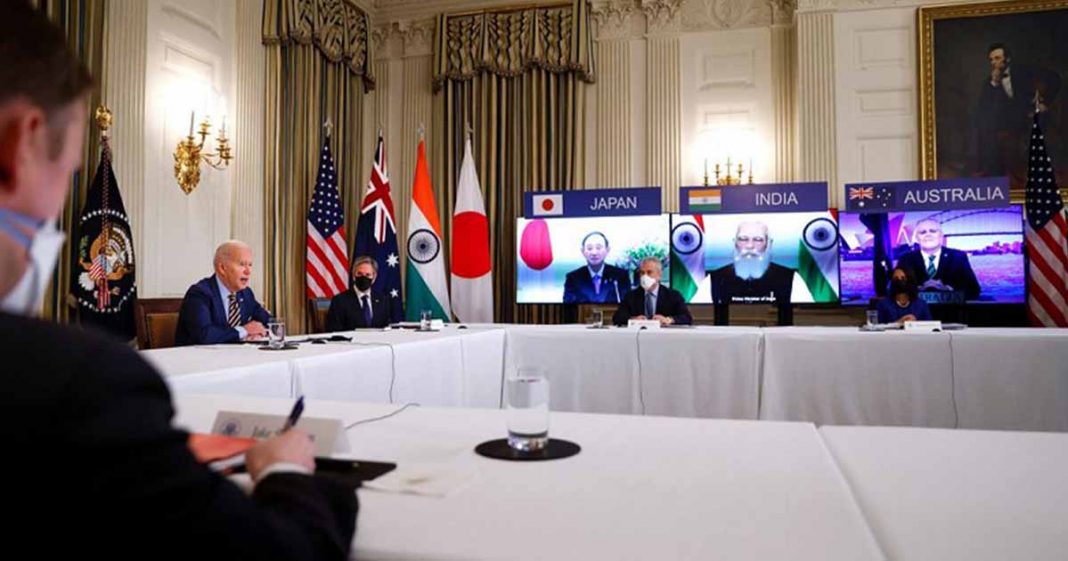The new Quad has been formed in the Middle East region that included USA, India, Israel and UAE. It has been assumed that this alliance will widen the Indo-US footprints in the Middle Eastern region for containing China. The first virtual meeting between the United States, Israel and UAE excluding India was initiated by Israeli Foreign Minister Yair Lapid during his visit to Washington Dc on 13 October 2021. It was a reminder of the extent of transformation in West Asia since the announcement of the Abraham Accords on 14 August 2020.
The virtual meeting of Foreign Ministers of US, India, Israel and UAE to formulate Second Quad alliances was held on 20 October 2021 during the India external Affairs Minister Dr. S. Jaishankar’s visit to Israel. Though all these states have bilateral cooperation with each other in a wide range of areas, including health care, technology, security, big data and economics. But simultaneously, there is also a strong supporter of US, Indian, Israeli, and Emirati leaders to forge Quadrilateral partnerships. These four countries will likely focus on trade, maritime security, technology, and joint infrastructural development projects within the framework of this planned forum.
Read more: To save face, India shifts focus to QUAD alliances for geo-politics
Biden’s move to counter China
However, the Biden administration is active to counter China in multiple regions as the US has already reenergized itself in the Indo-Pacific region. The US has not confined itself to Indo-Pacific but also signed a Trilateral Security Pact with Australia and UK on 15 September 2021 to Counter China, which is called AUKUS deal. Therefore, the new Quad alliance in the Middle East indicates that China’s challenges go beyond the Indo-Pacific region and it has to be contained in other regions.
India and U.S recognized that they need each other to curtail the growing influence of China in the Middle East. China’s influence in the Middle East, particularly in Israel and the UAE, had been growing despite the fact that both are close U.S. security partners. India already has a lot of soft power in the Middle East combined with a huge Indian diaspora of nearly 8 million. The Middle East is an important foreign market for Indian exporters, which can grow further given the region’s youth-dominated demography. Being part of two Quad coalitions allows India to spread its wings in a variety of ways from the Indo-Pacific to the Mediterranean landmass.
Israel and UAE are emerging technological powers and after Abraham Accord they are building a Middle Eastern coalition. On the Other hand, China is heavily investing in the Middle Eastern region. China and Iran have signed a $400 billion deal, setting aside US sanctions on Iran. China will invest across Iran for the next 25 years in return for Iranian oil. In addition to its investment clauses, the agreement also calls for security cooperation and an intelligence partnership. This agreement has increased American aggressiveness toward both China and Iran.
Read more: Quad bounces back with an in-person summit at Washington
The United States and India might benefit from such an arrangement
By contrast, neither Israel nor the UAE has a similar interest in containing China. Unlike the U.S. and India, neither country is directly threatened by China’s rise. Trade and investment have flourished between Israel, the UAE and China. The two countries have also expressed interest in participating in the Belt and Road Initiative. More than 60 percent of China’s trade with West Asia and North Africa passes through the UAE.
Israel has already supported the Indian stance on Kashmir at various forums, the Middle Eastern quad alliance can further encourage Indian atrocities in Kashmir. Whatever would be the alliance, whether it’s Indo-Pacific, AUSKUS and Middle Eastern Quad alliance, its main objective for the US and India is to contain the emergence of China’s military and economic might globally?
On contrary, Pakistan-China positively contributes to the development in the region through BRI/CPEC and not encircling and curtailing any other state. Pakistan is China’s partner and China-Pakistan Economic Corridor is a major and pilot project of the Belt and Road Initiative. CPEC is a game-changer project not only for Pakistan but also for the rest of the region. The main objective of the Sino-Pak alliance is the development of the region not a part of the containment policy against any state.
Read more: The “New Quad” is a geostrategic masterstroke for Pakistan
Pakistan is not a part of the US, India, Israel and UAE second Quad alliance and apparently, there are no direct effects of this Middle Eastern alliance on Pakistan but its influence can indirectly affect the Pakistani diaspora in UAE. However, Pakistan-China needs to enhance the engagement with UAE leadership to maintain their space in the Middle East region in the evolving policy of confrontation.
The writer is Islamabad based analyst and can be reached at sarahamidkhan21dec@gmail.com. The views expressed in this article are the author’s own and do not necessarily reflect the editorial policy of Global Village Space.














